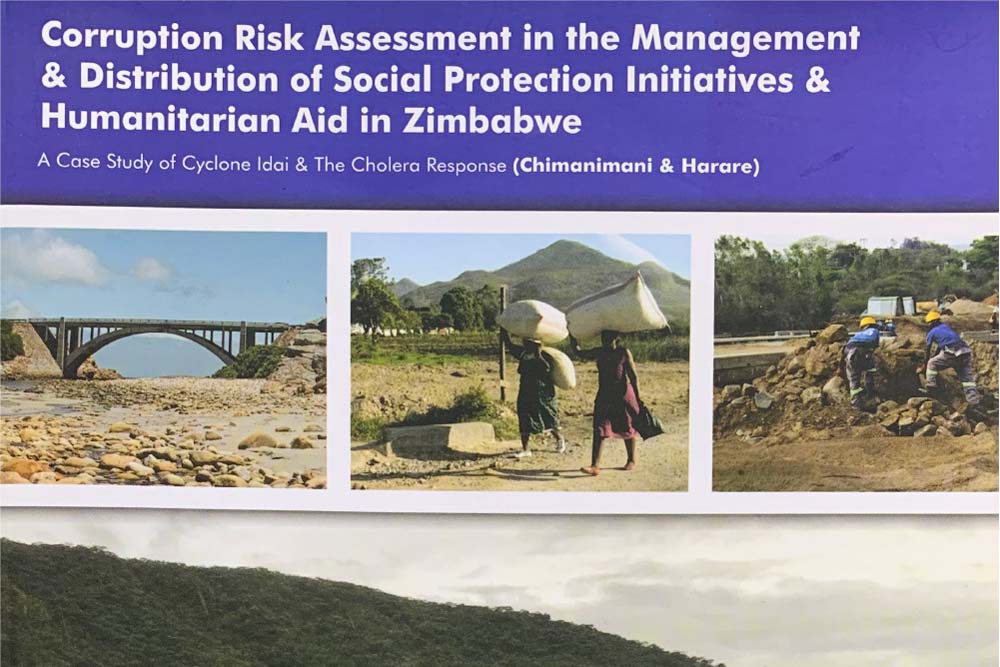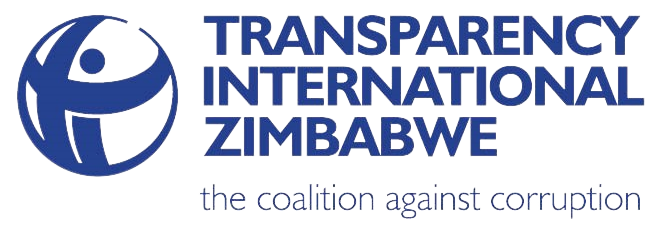Gender and Corruption in Zimbabwe. January 2020. ISBN 978-1-77929-948-2
September 30, 2021Corruption Risk Assessment of Mining Awards in Zimbabwe ISBN 978-0-7974-8299-9
September 30, 2021
Zimbabwe has been experiencing a series of natural disasters over the past few years. These include the #Cyclone Idai which affected Manicaland and some parts of Masvingo in March 2019, and recurring floods in low lying areas such as Muzarabani and Binga. Currently the world over is grappling with the spread of the #Corona Virus (#COVID-19) which has become a global pandemic. In the African Region the number of conformed cases continue to rise. The official number of confirmed positive cases in Zimbabwe is currently sitting at three, however, this is likely to rise as people continue not to make social distancing a priority.
Implications of corruption on #COVID-19early dictation and case management
As has been witnessed in the past, corruption often thrives during times of crisis. It is during this time that institutions and oversight mechanisms are weak as the Government and other stakeholders are under pressure to disburse aid rapidly and alleviate the suffering of those affected. Studies have also shown that countries in which the majority of humanitarian aid is delivered already suffer from high levels of corruption prior to an emergency. The cholera epidemic of 2018 and the Cyclone Idai national disaster of 2019 exposed the ugly face of corruption in humanitarian aid and social protection initiatives. A study by Transparency International Zimbabwe on corruption risks and vulnerabilities in social protection and humanitarian aid initiatives with a focus on the cyclone Idai (Chimanimani) and cholera pandemic in Harare (Budiriro and Glenview) revealed massive corruption and abuse of public funds and aid from well-wishers by those who had the responsibility to
distribute aid. Some of the key issues which emanated from the study include the following:
- The vulnerable being forced to bribe officials (extortion and kickbacks) to get aid.
- Sextortion and sexual abuse of women officials distributing aid abusing mostly women to gain sexual favors in return for aid.
- Patronage- only those belonging to certain political parties bene?ting from the aid
- Manipulation of regulations in the distribution of aid (bias and favouritism)
- Influence-peddling (favour-brokering and conflicts of interest)
- Flouting procurement regulations and inflating prices of aid commodities
The World Health Organization( WHO) recently declared #COVID-19 a global disaster and a few ago back Zimbabwe also declared #COVID-19 a national disaster through Statutory Instrument 76/2020 Civil Protection (Declaration of State of Disaster Rural and Urban Areas of Zimbabwe) (COVID-19) Notice, 2020. The fact that the country has declared #COVID 19 a national disaster means that resources and humanitarian aid will be channeled towards early dictation and case management of suspected COVID-19 cases Zimbabwe. So far the country has received aid from the Jack Ma and Alibaba Foundation is currently upgrading of the Wilkins hospital in Harare.
It is therefore important for the Government and relevant stakeholders to be cognisant of the various risks and vulnerabilities that may emanate at a time like this as we deal with the #COVID-19 as a nation and take measures to safeguard against these. Allowing corruption to thrive at a time like this will only result in those in dire need of the assistance not benefitting from the resources availed.
TIZ recommendations to strengthen transparency in the use of public funds during the COVID 19 crisis.
- Government should improve access to information as it relates to funds and aid meant for #COVID-19: Section 62 of the Constitution of Zimbabwe Amendment (No.20) Act, 2013 provides for the right to information held by the State or any government institution or agency in the interest of public accountability. In light of this Constitutional provision, TI Z calls upon government to ensure that information pertaining to funds and aid received for #COVID-19 be availed for public scrutiny. The Government is urged to take advantage of
information and communications technology to disseminate such information. TI Z also recommends that the Inter-ministerial task force on #COVID-19 sets up a website wherein stakeholders can utilise to make their
donations. This will improve transparency and accountability.
- Beneficial ownership disclosure and transparency on companies supplying #COVID-19 goods and services: Section 72 of the Companies and Business Entities Act [CHAPTER 24:31]notes that companies should
disclose the beneficial owners of their businesses in order to avoid fraud, misuse of political power to get tenders as well as conflict of interest. TI Z therefore calls upon the Government through the Procurement Regulation of Zimbabwe (PRAZ) to publish names of all companies supplying goods and services during this period to disclose their beneficial owners. This information must be verifiable.
- Procurement procedures still need maintained: During emergency situations like the one we are currently in, there is increased rush for the government to be seen be doing something and secure supplies, in the process disregarding public procurement regulations. TI Z recommends that while emergency procedures are needed, they must remain publicly accountable for every contract concluded and spent. Government must consider adopting open contracting to enhance transparency and accountability in public procurement.
- Developing a patient’s service charter specifically for #COVID19: Due to the unique nature of #COVID-19, TI Z recommends that the Ministry of Health and Child Care adopts a patient’s charter that is specifically related to the virus. The service charter should clearly state the rights of patients, fees charged to get treatment, if any, complaints handling mechanisms among other issues. This charter will empower patients and other stakeholders to hold officials to account in the event of malpractices and abuse of power. The Government through its various agencies should educate the public about the service charter.
- Whistle blower policy and protection mechanism: In order to facilitate reporting of corruption and abuse of public office, TI Z encourages the GoZ to come up with a whistle blower policy that protects victims and witnesses of corruption. This policy will enable the public to timely report corruption without fear of victimization.
- Periodic monitoring, evaluation and reporting of COVID-19 response mechanisms: The Government should constantly seek feedback from the citizens through various channels of communication for the purposes of monitoring and evaluating effectiveness and efficiency of the #COVID-19 response mechanisms being used by the government. This will enable the government to account for the results emanating from resources being channeled towards #COVID-19, thus fostering accountability and transparency in the use of public funds.
- Donors, NGOs, FBOs and CSOs to should put in place mechanisms to prevent corruption: TI Z also encourages donors, NGOs, CSOs and other organizations that are working with government to mitigate the
impact of #COVID-19 to ensure that there are internal mechanisms and safeguarding policies that prevent corruption and abuse of recipients of humanitarian aid.
